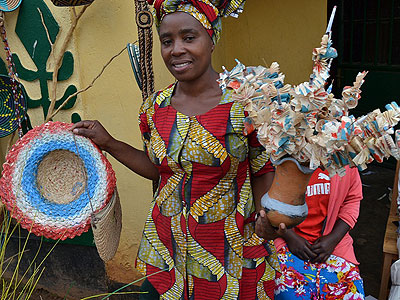GERMAINE UJENEZA’s innovation and creativity are things you can’t miss when you visit her work place. Having dropped out of school in S5, where she was doing home economics and tailoring among other artisan options, Ujeneza found solace in making artisanal products.


GERMAINE UJENEZA’s innovation and creativity are things you can’t miss when you visit her work place. Having dropped out of school in S5, where she was doing home economics and tailoring among other artisan options, Ujeneza found solace in making artisanal products.
The mother of three hails from Kigombe cell, Muhoza Sector in Musanze District.
"After the Genocide against the Tutsi, I got married to a S6 dropout. We decided that one of us should continue with studies and my husband enrolled for university studies,” she says.
Later she started looking for a job before venturing into artisan products.
Ujeneza says her life transformed when her innovation of a traditional food heater she designed won in a competition that had been organised at the district level.
"I made a food heater from clothes and other materials and emerged the best at district level. The award inspired me to scale greater heights,” she says.
The product she named peace maker can keep food hot for 12hours and has attracted many buyers. Ujeneza also boasts of about eight certificates from various competitions at district as well as national level.
Ujeneza’s other products are made from Maize leaves, used paper and small pieces of clothes that are discarded after tailoring. She also makes furniture such as tables, baskets, plates among others using paper.
"I mix paper with water and then stick them using glue. I shape them accordingly and then apply varnish to make them harder and durable,” she says.
"One may for example think that this table was made from wood but it is not the case. It is made from papers and many people wonder how I do it,” she says as she stands on the table to prove its durability.
Ujeneza also makes necklaces, bags, caps among others from banana and maize leaves.
"I realised that agricultural materials such as banana and maize leaves were not being utilised. I decided to employ my artisan skills to make good use of them,” she says
Gets more money
Ujeneza says after excelling in making artisan materials, she found it necessary to share her skills with other people.
"I had built a good name for myself. I made products that I took to various exhibitions and my clientele had grown,” she says.
She founded a school named "Iriba ry’Ubumenyi” loosely translated as the "source of knowledge,” with a major aim of equipping young people especially young girls with skills.
The school currently has over 50 students, including a group of women.
They mainly specialise in tailoring and handcraft.
"Apart from earnings from the products I sell, I also teach students at a fee per month. I am able to save about Rwf200,000 per month after meeting all expenses,” she says
Ujeneza employs four people who help train her students.
"I want to help more people acquire skills. The ones I am training will help train others,” she says
Challenges
Ujeneza faces a challenge of lack of funds to expand her activities. She also lacks enough training to boost her skills.
"We need more training in order to cope with the changing times. There are things we fail to do because we lack the necessary training. We also need advice from the Workforce Development Authority officials,” she says.
Beneficiaries speak out
"I dropped out of school in S3 after realising that I was academically weak. I decided to come for training and after one year, I started making money. I now earn at least Rwf4,000 daily which I use to buy basic necessities,” said Triphonie Dusabemariya, one of the beneficiaries.
"We are now one family. We study well and also talk about other developmental issues in society. If things continue like this, we will be job creators,” said another beneficiary, only identified as Harelimana.


